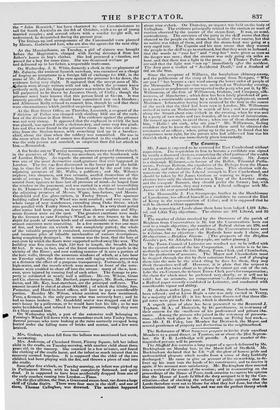A fire broke out on Tuesday morning, between two and
three o'clock, in the premises of Mr. Wilson, tea-merchant, on the Southwark side of London Bridge. As regards the amount of property consumed, it was one of the most destructive conflagrations that ever happened in London. The fire was first discovered in the lower part of the build- ing, in time for all the inmates to have escaped by the roof into the adjoining premises of Mr. Wallis, a publican ; and Mr. Wilson's nephew, two shopmen, and two servants, availed themselves of this mode of escape ; but Mr. Wilson, himself, whose chamber was on the second floor, appears to have lost all presence of mind—he leaped from the window to the pavement, and was carried in a state of insensibility to St. Thomas's Hospital. In the mean while, the flames had reached the adjoining premises of Messrs. Wigan, hop-factors, and Messrs. Goodchild and Co. glass-cutters, in Tooley Street. The spacious building called Fenning's Wharf was next assailed ; and very soon the whole range of new warehouses, extending along Duke Street, which runs parallel with Tooley Street, was in flames. In a very short period after notice had been given, no fewer than eleven engines and fifty- seven firemen were on the spot. The greatest exertions were made by the firemen to save Fenning's Wharf, as it was known to be the depot for goods of various kinds and of considerable value. But their utmost exertions were unavailing. In a few moments it was one mass of fire, and before six o'clock it was completely gutted; the whole of the valuable property it contained, consisting of provisions, cloth, and immense piles of valuable merchandise of various descriptions, being completely destroyel. So intense was the heat, that the bars of cast-iron by which the floors were supported melted away like wax. The building was five stories high, 150 feet in length, the breadth being 80 feet. It was, in fact, one of the finest storehouses for goods in the vicinity of the River ; and now nothing remains of it save a portion of the bare walls, through the numerous windows of which, at a late hour on Tuesday night, the flames were seen still raging within, presenting at a distance the effect of a gorgeous transparency. Fortunately, it was high-water, and the vessels which were moored in front of the ware- houses were enabled to sheer off into the stream : many of them, how- ever, were injured by running foul of each other. The damage to pro- perty is estimated at nearly half a million : Messrs. Wilson, Grant and Co. cheese-factors, Mr. Burford, paper-hanger, Mr. Rush, cheese- factor, and Mr. Key, lead-merchant, are the principal sufferers. The amount insured is stated at about 300,000/. ; of which the Globe, Sun, Protector, and Hand-in-hand offices, will have to pay a considerable portion. Besides Mr. Wilson, whose accident we have mentioned, Fenn, a fireman, is the only person who was seriously hurt ; and he had no bones broken. Mr. Goodchild senior was dragged out of his son's house by a policeman, or he would have lost his life ; as he was quite bewildere4 and refused to leave the premises, though they were an a blaze around him.
On Wednesday night, a part of the extensive wall belonging to Fenning's Wharf fell down with a tremendous crash into Tooley Street. Several persons who were looking at the ruins narrowly escaped being buried under the falling mass of bricks and mortar, and a few were bruised.


























 Previous page
Previous page